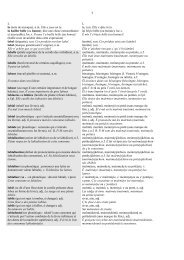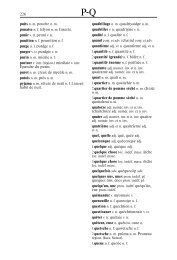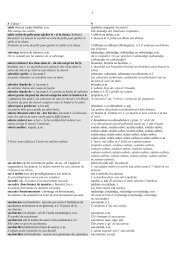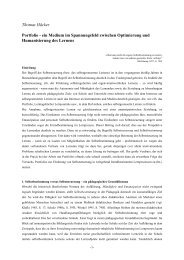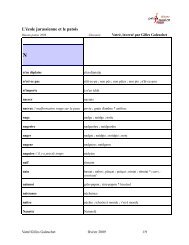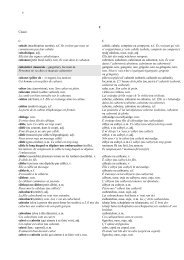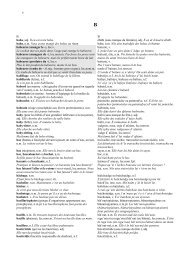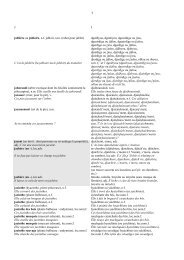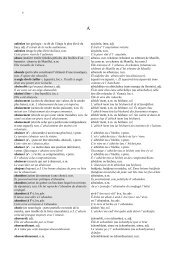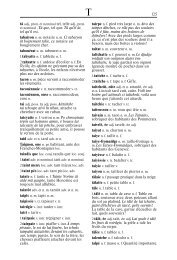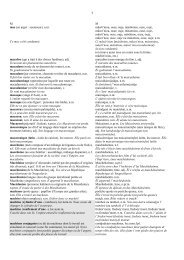R Classé ! R ra (onomatopée : coup de baguette ... - Image du Jura
R Classé ! R ra (onomatopée : coup de baguette ... - Image du Jura
R Classé ! R ra (onomatopée : coup de baguette ... - Image du Jura
Create successful ePaper yourself
Turn your PDF publications into a flip-book with our unique Google optimized e-Paper software.
Nous n’aimons pas le mauvais <strong>ra</strong>vaudage. tchétron, n.m. Nôs n’ ainmans p’ l’ aidjotçhaidge,<br />
l’ empoulaidge, l’ encapoulaidge ou le tchétron).<br />
<strong>ra</strong>vaudage (mauvais -), loc.nom.m.<br />
r’tchét<strong>ra</strong>idge, rtchét<strong>ra</strong>idge, r’tchétron ou rtchétron, n.m.<br />
Je n’admets pas ce mauvais <strong>ra</strong>vaudage.<br />
I n’ aidmâts p’ ci r’tchét<strong>ra</strong>idge (rtchét<strong>ra</strong>idge, r’tchétron ou<br />
rtchétron).<br />
(on trouve aussi tous ces noms sous la forme : eur’tchét<strong>ra</strong>idge,<br />
etc.)<br />
<strong>ra</strong>vau<strong>de</strong>r (mal -), loc.v.<br />
eur’tchét<strong>ra</strong>ie, eurtchét<strong>ra</strong>ie, r’tchét<strong>ra</strong>ie ou rtchét<strong>ra</strong>ie, v.<br />
Notre fillette a mal <strong>ra</strong>vaudé ma chaussette.<br />
Note baîchatte é eur’tchétrè (eurtchétrè, r’tchétrè ou rtchétrè)<br />
mai tchâsse.<br />
<strong>ra</strong>vau<strong>de</strong>ur (mauvais -), loc.nom.m.<br />
eur’tchétrou, ouse, ouje, eurtchétrou, ouse, ouje,<br />
r’tchétrou, ouse, ouje, rtchétrou, ouse, ouje ou<br />
Pourquoi n’as-tu pas renvoyé ce mauvais <strong>ra</strong>vau<strong>de</strong>ur ? tchétrou, ouse, ouje, n.m. Poquoi qu’ t’ n’ és p’ renvie<br />
c’t’ eur’tchétrou (ç’t’ eurtchétrou, ci r’tchétrou, ci rtchétrou ou<br />
ci tchétrou) ?<br />
<strong>ra</strong>ve (chou-), n.m.<br />
tchô-<strong>ra</strong>îve, tchô-<strong>ra</strong>ive, tcho-<strong>ra</strong>îve, tcho-<strong>ra</strong>ive, tchôs-<strong>ra</strong>îve, tchôs-<br />
Maman, tu nous as fait <strong>de</strong> bons choux-<strong>ra</strong>ves. <strong>ra</strong>ive, tchos-<strong>ra</strong>îve ou tchos-<strong>ra</strong>ive, n.m. Mére, t’ nôs és fait <strong>de</strong>s<br />
bons tchôs-<strong>ra</strong>îves (tchôs-<strong>ra</strong>ives, tchos-<strong>ra</strong>îves ou tchos-<strong>ra</strong>ives).<br />
<strong>ra</strong>venelle (nom commun <strong>de</strong> la giroflée <strong>de</strong>s jardins), dgé<strong>ra</strong>nchiere <strong>de</strong>s coeurtis (djaidgïns, potaidgies, queurtis,<br />
n.f.<br />
tçheurtis, tçheutchis, tieurtis, tieutchis, tyeurtis ou tyeutchis),<br />
Elle arrose les <strong>ra</strong>venelles.<br />
loc.nom.f. Èlle ennâve les dgé<strong>ra</strong>inchieres <strong>de</strong>s coeurtis (djaidgïns,<br />
potaidgies, queurtis, tçheurtis, tçheutchis, tieurtis, tieutchis,<br />
tyeurtis ou tyeutchis).<br />
<strong>ra</strong>ve (une - pour ton nez !; fr.rég.), loc. Une <strong>ra</strong>ve ènne <strong>ra</strong>îve (ou <strong>ra</strong>ive) po ton nèz !, loc. Enne <strong>ra</strong>îve (ou <strong>ra</strong>ive) po<br />
pour ton nez que je t’ai<strong>de</strong><strong>ra</strong>i ! (Ne compte pas sur moi<br />
pour t’ai<strong>de</strong>r !)<br />
ton nèz qu’ i t’ veus édie !<br />
<strong>ra</strong>ya ou <strong>ra</strong>ïa (terme <strong>de</strong> mépris dont les Turcs se<br />
servaient pour désigner leurs sujets non-musulmans),<br />
reumia ou romia, n.m.<br />
n.m. Il n’aimait pas qu’on le t<strong>ra</strong>ite <strong>de</strong> <strong>ra</strong>ya (ou <strong>ra</strong>ïa). È n’ ainmait p’ qu’ an l’ tréteuche <strong>de</strong> reumia (ou romia).<br />
<strong>ra</strong>yage ou <strong>ra</strong>yement (opé<strong>ra</strong>tion qui consiste à <strong>ra</strong>îyaidge, <strong>ra</strong>iyaidge, râyaidge, <strong>ra</strong>yaidge, réyaidge, roiyaidge,<br />
p<strong>ra</strong>tiquer <strong>de</strong>s <strong>ra</strong>yures dans le canon d’une arme à feu), roûelaidge ou rouelaidge, n.m.<br />
n.m. Il recommence le <strong>ra</strong>yage (ou <strong>ra</strong>yement) <strong>du</strong> È rècmence le <strong>ra</strong>îyaidge (<strong>ra</strong>iyaidge, râyaidge, <strong>ra</strong>yaidge,<br />
canon.<br />
réyaidge, roiyaidge, roûelaidge ou rouelaidge) di cainnon.<br />
<strong>ra</strong>yé (qui porte une <strong>ra</strong>yure, <strong>de</strong>s <strong>ra</strong>yures, <strong>de</strong>s é<strong>ra</strong>flures), <strong>ra</strong>îyie, <strong>ra</strong>iyie, râyie, <strong>ra</strong>yie, réyie, roiyie (sans marque <strong>du</strong> féminin),<br />
adj. Ce miroir est <strong>ra</strong>yé.<br />
roûelè, e ou rouelè, e, adj. Ci mirou ât <strong>ra</strong>îyie (<strong>ra</strong>iyie, râyie, <strong>ra</strong>yie,<br />
réyie, roiyie, roûelè ou rouelè).<br />
<strong>ra</strong>yé (canon - ; canon d’une arme à feu dont <strong>ra</strong>îyie (<strong>ra</strong>iyie, râyie, <strong>ra</strong>yie, réyie, roiyie, roûelè ou rouelè) cainnon<br />
l’intérieur est conçu avec <strong>de</strong>s <strong>ra</strong>yures), loc.nom.m. Il (cainon, rôle, role, taipèt ou tapèt), loc.nom.m. È veut chutôt<br />
veut surtout que son arme ait un canon <strong>ra</strong>yé. qu’ son aîrme euche ïn <strong>ra</strong>îyie (<strong>ra</strong>iyie, râyie, <strong>ra</strong>yie, réyie, roiyie,<br />
roûelè ou rouelè) cainnon (cainon, rôle, role, taipèt ou tapèt).<br />
<strong>ra</strong>yé (vaisseau - ; en botanique : vaisseau <strong>du</strong> bois où <strong>ra</strong>îyie (<strong>ra</strong>iyie, râyie, <strong>ra</strong>yie, réyie, roiyie, roûelè ou rouelè) nèau,<br />
les épaississements <strong>de</strong> la lignine ont l’aspect <strong>de</strong> <strong>ra</strong>ies loc.nom.m. Ç’te piainte é <strong>de</strong>s <strong>ra</strong>îyies (<strong>ra</strong>iyies, râyies, <strong>ra</strong>yies,<br />
t<strong>ra</strong>nsversales), loc.nom.m. Cette plante a <strong>de</strong>s<br />
vaisseaux <strong>ra</strong>yés.<br />
réyies, roiyies, roûelès ou rouelès) nèaus.<br />
<strong>ra</strong>yer (marquer une surface d’une ou <strong>de</strong> plusieurs <strong>ra</strong>îyie, <strong>ra</strong>iyie, râyie, <strong>ra</strong>yie, roiyie, roûelaie ou rouelaie, v.<br />
<strong>ra</strong>ies), v. L’écolier <strong>ra</strong>ye <strong>du</strong> papier avec un c<strong>ra</strong>yon et L’ écôlie <strong>ra</strong>îye (<strong>ra</strong>iye, râye, <strong>ra</strong>ye, roiyie, roûelè ou rouelè) di<br />
une règle.<br />
paipie daivô ïn g<strong>ra</strong>iyon pe ènne yignâle.<br />
<strong>ra</strong>yer (t<strong>ra</strong>cer un t<strong>ra</strong>it sur un mot, un groupe <strong>de</strong> mots, <strong>ra</strong>îyie, <strong>ra</strong>iyie, râyie, <strong>ra</strong>yie, roiyie, roûelaie ou rouelaie, v.<br />
etc. pour l’annuler), v. Il a <strong>ra</strong>yé plus d’un nom <strong>de</strong> la Èl é <strong>ra</strong>îyie (<strong>ra</strong>iyie, râyie, <strong>ra</strong>yie, roiyie, roûelè ou rouelè) pus d’ ïn<br />
liste.<br />
nom d’ lai yichte.<br />
<strong>ra</strong>yère (étroite ouverture verticale p<strong>ra</strong>tiquée dans le <strong>ra</strong>îyiere, <strong>ra</strong>iyiere, râyiere, <strong>ra</strong>yiere, roiyiere, roûeliere ou roueliere,<br />
mur d’une tour pour en éclairer l’intérieur), n.f. Les n.f. Les <strong>ra</strong>îyieres (<strong>ra</strong>iyieres, râyieres, <strong>ra</strong>yieres, roiyieres,<br />
<strong>ra</strong>yères suivent l’escalier à vis <strong>de</strong> la tour.<br />
roûelieres ou rouelieres) cheûyant lai voûerbe d’ lai toué.<br />
<strong>ra</strong>y-g<strong>ra</strong>ss (planre herbacée, variété d’iv<strong>ra</strong>ie employée hierbe-leû, hierbe-leu, hierbe-yeû ou hierbe-yeu, n.m.<br />
pour les pelouses, les p<strong>ra</strong>iries artificielles), n.m. Le L’ hierbe-leû (hierbe-leu, hierbe-yeû ou hierbe-yeu) bèye ïn<br />
<strong>ra</strong>y-g<strong>ra</strong>ss donne un excellent four<strong>ra</strong>ge.<br />
défïnmeu foér<strong>ra</strong>idge.<br />
<strong>ra</strong>yon (<strong>de</strong> roue), n.m. Cette roue n’a bientôt plus <strong>de</strong> râ, <strong>ra</strong>, <strong>ra</strong>î, <strong>ra</strong>i, ré, rés, roi, roûe ou roue, n.m. Ç’te rûe n’é bïntôt<br />
<strong>ra</strong>yons.<br />
pus d’ râs (<strong>ra</strong>s, <strong>ra</strong>îs, <strong>ra</strong>is, rés, rés, rois, roûes ou roues).<br />
<strong>ra</strong>yon (<strong>de</strong> lumière, etc.), n.m. Si seulement il y avait râ, <strong>ra</strong>, <strong>ra</strong>î, <strong>ra</strong>i, ré, rés, roi, roûe ou roue, n.m. Che pie è y aivait ïn<br />
un <strong>ra</strong>yon <strong>de</strong> soleil.<br />
râ (<strong>ra</strong>, <strong>ra</strong>î, <strong>ra</strong>i, ré, rés, roi, roûe ou roue) <strong>de</strong> s’<strong>ra</strong>ye.<br />
25



